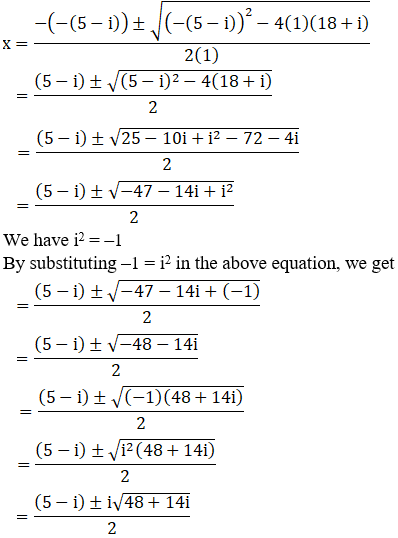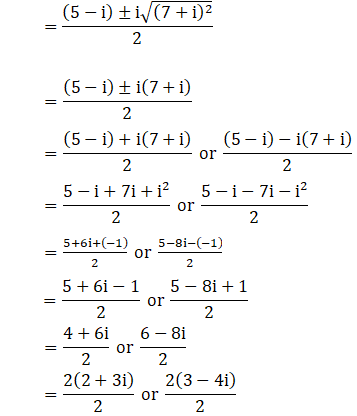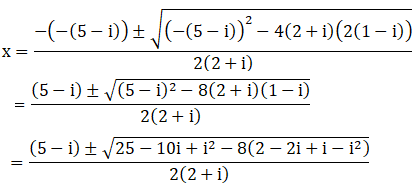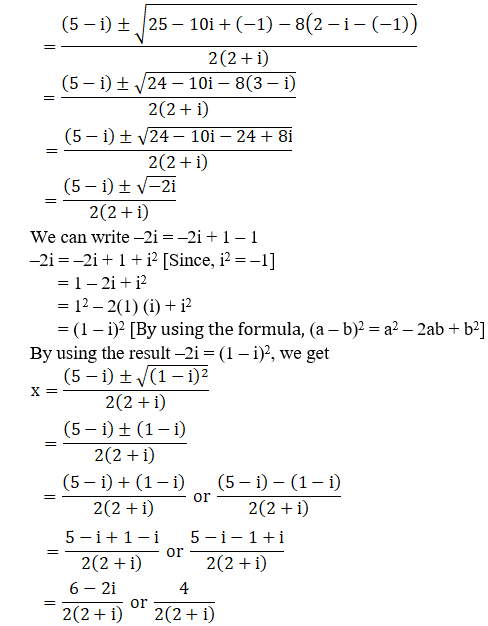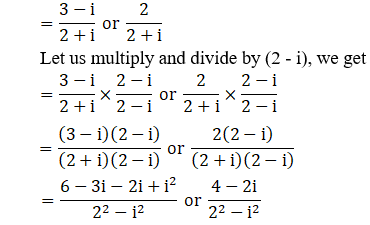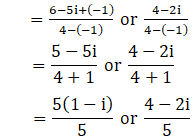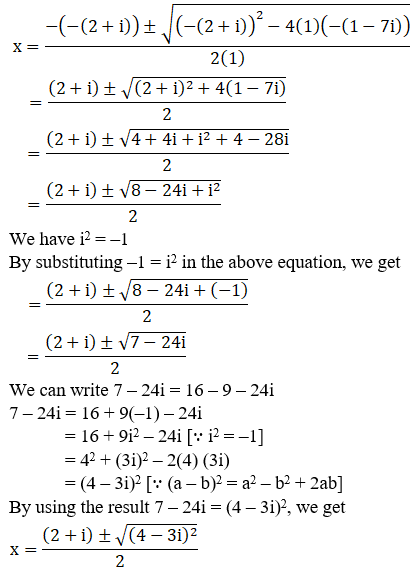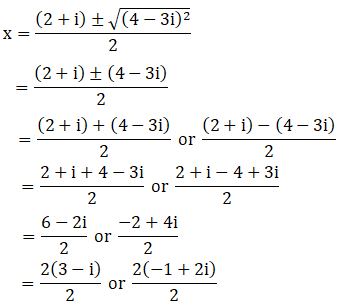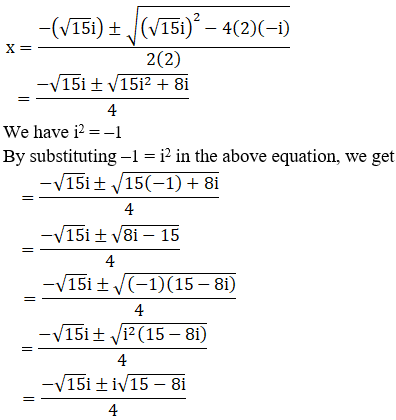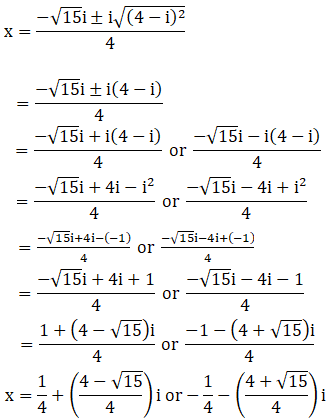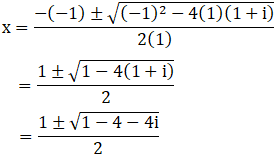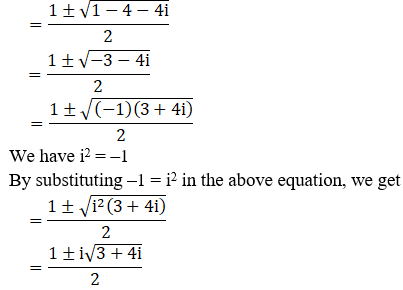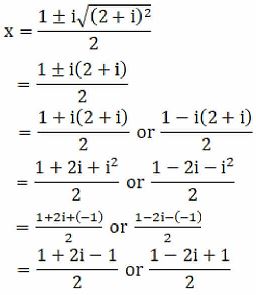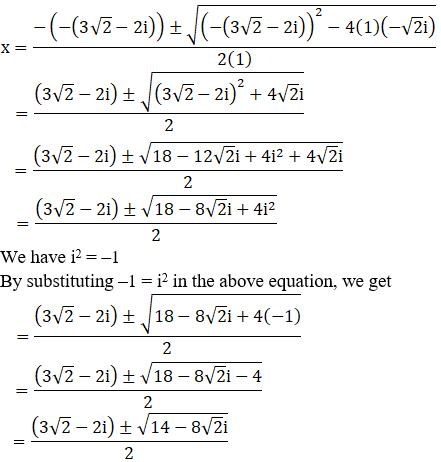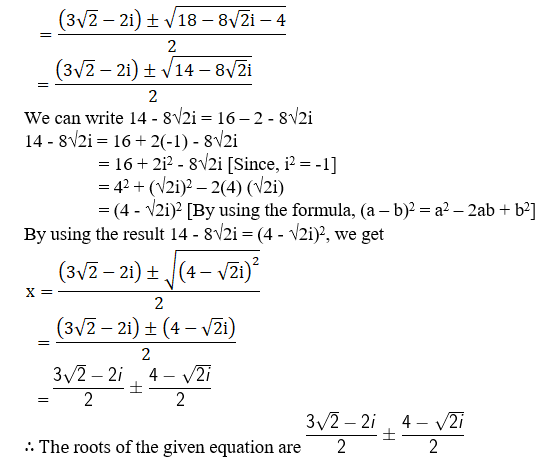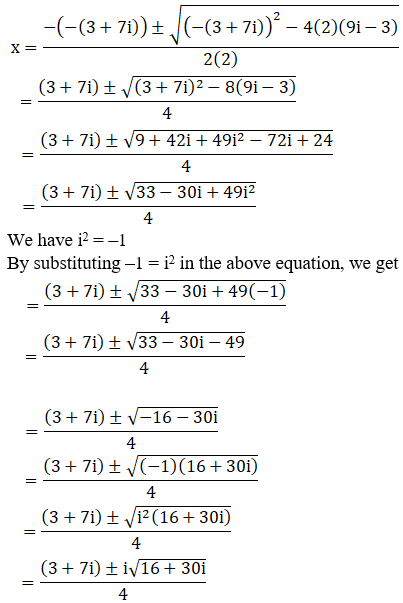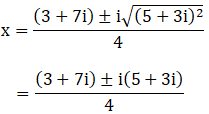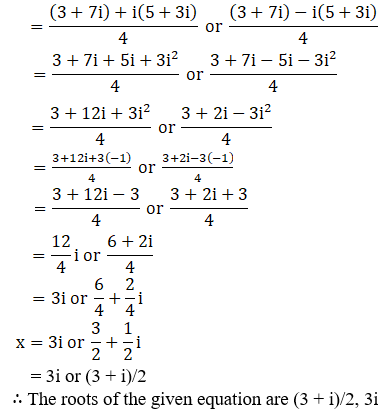
RD Sharma Solutions Class 11 Maths Chapter 14 Exercise 14.2: You can clear your basics and doubts with the RD Sharma Solutions Class 11 Maths. All the solutions designed by the subject matter experts are as per the current CBSE Syllabus. Go and download the Free PDF of RD Sharma Solutions Class 11 Maths Chapter 14 Exercise 14.2.
Download RD Sharma Solutions Class 11 Maths Chapter 14 Exercise 14.2 PDF:
RD Sharma Solutions Class 11 Maths Chapter 14 Exercise 14.2
Access answers of RD Sharma Solutions for Class 11 Maths Chapter 14 Exercise 14.2
1. Solving the following quadratic equations by factorization method:
(i) x2 + 10ix – 21 = 0
(ii) x2 + (1 – 2i)x – 2i = 0
(iii) x2 – (2√3 + 3i) x + 6√3i = 0
(iv) 6x2 – 17ix – 12 = 0
Solution:
(i) x2 + 10ix – 21 = 0
Given: x2 + 10ix – 21 = 0
x2 + 10ix – 21 × 1 = 0
We know, i2 = –1 ⇒ 1 = –i2
By substituting 1 = –i2 in the above equation, we get
x2 + 10ix – 21(–i2) = 0
x2 + 10ix + 21i2 = 0
x2 + 3ix + 7ix + 21i2 = 0
x(x + 3i) + 7i(x + 3i) = 0
(x + 3i) (x + 7i) = 0
x + 3i = 0 or x + 7i = 0
x = –3i or –7i
∴ The roots of the given equation are –3i, –7i
(ii) x2 + (1 – 2i)x – 2i = 0
Given: x2 + (1 – 2i)x – 2i = 0
x2 + x – 2ix – 2i = 0
x(x + 1) – 2i(x + 1) = 0
(x + 1) (x – 2i) = 0
x + 1 = 0 or x – 2i = 0
x = –1 or 2i
∴ The roots of the given equation are –1, 2i
(iii) x2 – (2√3 + 3i) x + 6√3i = 0
Given: x2 – (2√3 + 3i) x + 6√3i = 0
x2 – (2√3x + 3ix) + 6√3i = 0
x2 – 2√3x – 3ix + 6√3i = 0
x(x – 2√3) – 3i(x – 2√3) = 0
(x – 2√3) (x – 3i) = 0
(x – 2√3) = 0 or (x – 3i) = 0
x = 2√3 or x = 3i
∴ The roots of the given equation are 2√3, 3i
(iv) 6x2 – 17ix – 12 = 0
Given: 6x2 – 17ix – 12 = 0
6x2 – 17ix – 12 × 1 = 0
We know, i2 = –1 ⇒ 1 = –i2
By substituting 1 = –i2 in the above equation, we get
6x2 – 17ix – 12(–i2) = 0
6x2 – 17ix + 12i2 = 0
6x2 – 9ix – 8ix + 12i2 = 0
3x(2x – 3i) – 4i(2x – 3i) = 0
(2x – 3i) (3x – 4i) = 0
2x – 3i = 0 or 3x – 4i = 0
2x = 3i or 3x = 4i
x = 3i/2 or x = 4i/3
∴ The roots of the given equation are 3i/2, 4i/3
2. Solve the following quadratic equations:
(i) x2 – (3√2 + 2i) x + 6√2i = 0
(ii) x2 – (5 – i) x + (18 + i) = 0
(iii) (2 + i)x2 – (5- i)x + 2 (1 – i) = 0
(iv) x2 – (2 + i)x – (1 – 7i) = 0
(v) ix2 – 4x – 4i = 0
(vi) x2 + 4ix – 4 = 0
(vii) 2x2 + √15ix – i = 0
(viii) x2 – x + (1 + i) = 0
(ix) ix2 – x + 12i = 0
(x) x2 – (3√2 – 2i)x – √2i = 0
(xi) x2 – (√2 + i)x + √2i = 0
(xii) 2x2 – (3 + 7i)x + (9i – 3) = 0
Solution:
(i) x2 – (3√2 + 2i) x + 6√2i = 0
Given: x2 – (3√2 + 2i) x + 6√2i = 0
x2 – (3√2x + 2ix) + 6√2i = 0
x2 – 3√2x – 2ix + 6√2i = 0
x(x – 3√2) – 2i(x – 3√2) = 0
(x – 3√2) (x – 2i) = 0
(x – 3√2) = 0 or (x – 2i) = 0
x = 3√2 or x = 2i
∴ The roots of the given equation are 3√2, 2i
(ii) x2 – (5 – i) x + (18 + i) = 0
Given: x2 – (5 – i) x + (18 + i) = 0
We shall apply the discriminant rule,
Where, x = (-b ±√(b2 – 4ac))/2a
Here, a = 1, b = -(5-i), c = (18+i)
So,
We can write 48 + 14i = 49 – 1 + 14i
So,
48 + 14i = 49 + i2 + 14i [∵ i2 = –1]
= 72 + i2 + 2(7)(i)
= (7 + i)2 [Since, (a + b)2 = a2 + b2 + 2ab]
By using the result 48 + 14i = (7 + i) 2, we get
x = 2 + 3i or 3 – 4i
∴ The roots of the given equation are 3 – 4i, 2 + 3i
(iii) (2 + i)x2 – (5- i)x + 2 (1 – i) = 0
Given: (2 + i)x2 – (5- i)x + 2 (1 – i) = 0
We shall apply the discriminant rule,
Where, x = (-b ±√(b2 – 4ac))/2a
Here, a = (2+i), b = -(5-i), c = 2(1-i)
So,
We have i2 = –1
By substituting –1 = i2 in the above equation, we get
x = (1 – i) or 4/5 – 2i/5
∴ The roots of the given equation are (1 – i), 4/5 – 2i/5
(iv) x2 – (2 + i)x – (1 – 7i) = 0
Given: x2 – (2 + i)x – (1 – 7i) = 0
We shall apply the discriminant rule,
Where, x = (-b ±√(b2 – 4ac))/2a
Here, a = 1, b = -(2+i), c = -(1-7i)
So,
We can write 7 – 24i = 16 – 9 – 24i
7 – 24i = 16 + 9(–1) – 24i
= 16 + 9i2 – 24i [∵ i2 = –1]
= 42 + (3i)2 – 2(4) (3i)
= (4 – 3i)2 [∵ (a – b)2 = a2 – b2 + 2ab]
By using the result 7 – 24i = (4 – 3i)2, we get
x = 3 – i or -1 + 2i
∴ The roots of the given equation are (-1 + 2i), (3 – i)
(v) ix2 – 4x – 4i = 0
Given: ix2 – 4x – 4i = 0
ix2 + 4x(–1) – 4i = 0 [We know, i2 = –1]
So by substituting –1 = i2 in the above equation, we get
ix2 + 4xi2 – 4i = 0
i(x2 + 4ix – 4) = 0
x2 + 4ix – 4 = 0
x2 + 4ix + 4(–1) = 0
x2 + 4ix + 4i2 = 0 [Since, i2 = –1]
x2 + 2ix + 2ix + 4i2 = 0
x(x + 2i) + 2i(x + 2i) = 0
(x + 2i) (x + 2i) = 0
(x + 2i)2 = 0
x + 2i = 0
x = –2i, -2i
∴ The roots of the given equation are –2i, –2i
(vi) x2 + 4ix – 4 = 0
Given: x2 + 4ix – 4 = 0
x2 + 4ix + 4(–1) = 0 [We know, i2 = –1]
So by substituting –1 = i2 in the above equation, we get
x2 + 4ix + 4i2 = 0
x2 + 2ix + 2ix + 4i2 = 0
x(x + 2i) + 2i(x + 2i) = 0
(x + 2i) (x + 2i) = 0
(x + 2i)2 = 0
x + 2i = 0
x = –2i, -2i
∴ The roots of the given equation are –2i, –2i
(vii) 2x2 + √15ix – i = 0
Given: 2x2 + √15ix – i = 0
We shall apply the discriminant rule,
Where, x = (-b ±√(b2 – 4ac))/2a
Here, a = 2, b = √15i, c = -i
So,
We can write 15 – 8i = 16 – 1 – 8i
15 – 8i = 16 + (–1) – 8i
= 16 + i2 – 8i [∵ i2 = –1]
= 42 + (i)2 – 2(4)(i)
= (4 – i)2 [Since, (a – b)2 = a2 – b2 + 2ab]
By using the result 15 – 8i = (4 – i)2, we get
∴ The roots of the given equation are [1+ (4 – √15)i/4] , [-1 -(4 + √15)i/4]
(viii) x2 – x + (1 + i) = 0
Given: x2 – x + (1 + i) = 0
We shall apply the discriminant rule,
Where, x = (-b ±√(b2 – 4ac))/2a
Here, a = 1, b = -1, c = (1+i)
So,
We can write 3 + 4i = 4 – 1 + 4i
3 + 4i = 4 + i2 + 4i [∵ i2 = –1]
= 22 + i2 + 2(2) (i)
= (2 + i)2 [Since, (a + b)2 = a2 + b2 + 2ab]
By using the result 3 + 4i = (2 + i)2, we get
x = 2i/2 or (2 – 2i)/2
x = i or 2(1-i)/2
x = i or (1 – i)
∴ The roots of the given equation are (1-i), i
(ix) ix2 – x + 12i = 0
Given: ix2 – x + 12i = 0
ix2 + x(–1) + 12i = 0 [We know, i2 = –1]
so by substituting –1 = i2 in the above equation, we get
ix2 + xi2 + 12i = 0
i(x2 + ix + 12) = 0
x2 + ix + 12 = 0
x2 + ix – 12(–1) = 0
x2 + ix – 12i2 = 0 [Since, i2 = –1]
x2 – 3ix + 4ix – 12i2 = 0
x(x – 3i) + 4i(x – 3i) = 0
(x – 3i) (x + 4i) = 0
x – 3i = 0 or x + 4i = 0
x = 3i or –4i
∴ The roots of the given equation are -4i, 3i
(x) x2 – (3√2 – 2i)x – √2i = 0
Given: x2 – (3√2 – 2i)x – √2i = 0
We shall apply the discriminant rule,
Where, x = (-b ±√(b2 – 4ac))/2a
Here, a = 1, b = -(3√2 – 2i), c = –√2i
So,
(xi) x2 – (√2 + i)x + √2i = 0
Given: x2 – (√2 + i)x + √2i = 0
x2 – (√2x + ix) + √2i = 0
x2 – √2x – ix + √2i = 0
x(x – √2) – i(x – √2) = 0
(x – √2) (x – i) = 0
(x – √2) = 0 or (x – i) = 0
x = √2 or x = i
∴ The roots of the given equation are i, √2
(xii) 2x2 – (3 + 7i)x + (9i – 3) = 0
Given: 2x2 – (3 + 7i)x + (9i – 3) = 0
We shall apply the discriminant rule,
Where, x = (-b ±√(b2 – 4ac))/2a
Here, a = 2, b = -(3 + 7i), c = (9i – 3)
So,
We can write 16 + 30i = 25 – 9 + 30i
16 + 30i = 25 + 9(–1) + 30i
= 25 + 9i2 + 30i [∵ i2 = –1]
= 52 + (3i)2 + 2(5)(3i)
= (5 + 3i)2 [∵ (a + b)2 = a2 + b2 + 2ab]
By using the result 16 + 30i = (5 + 3i)2, we get
This is the complete blog of RD Sharma Solutions for Class 11 Maths Chapter 14 Exercise 14.2. To Know more about the CBSE Class 11 Maths exam, ask in the comments.
FAQs of RD Sharma Solutions for Class 11 Maths Chapter 14 Exercise 14.2
How many questions are there in RD Sharma Solutions for Class 11 Maths Chapter 14 Exercise 14.2?
There are 2 questions in RD Sharma Solutions Class 11 Maths Chapter 14 Exercise 14.2.
From where can I download the PDF of RD Sharma Solutions Class 11 Maths Chapter 14 Ex 14.2?
You can find the download link from the above blog.
How much does it cost to download the PDF of RD Sharma Solutions for Class 11 Maths Chapter 14 Exercise 14.2?
You can download it for free.
